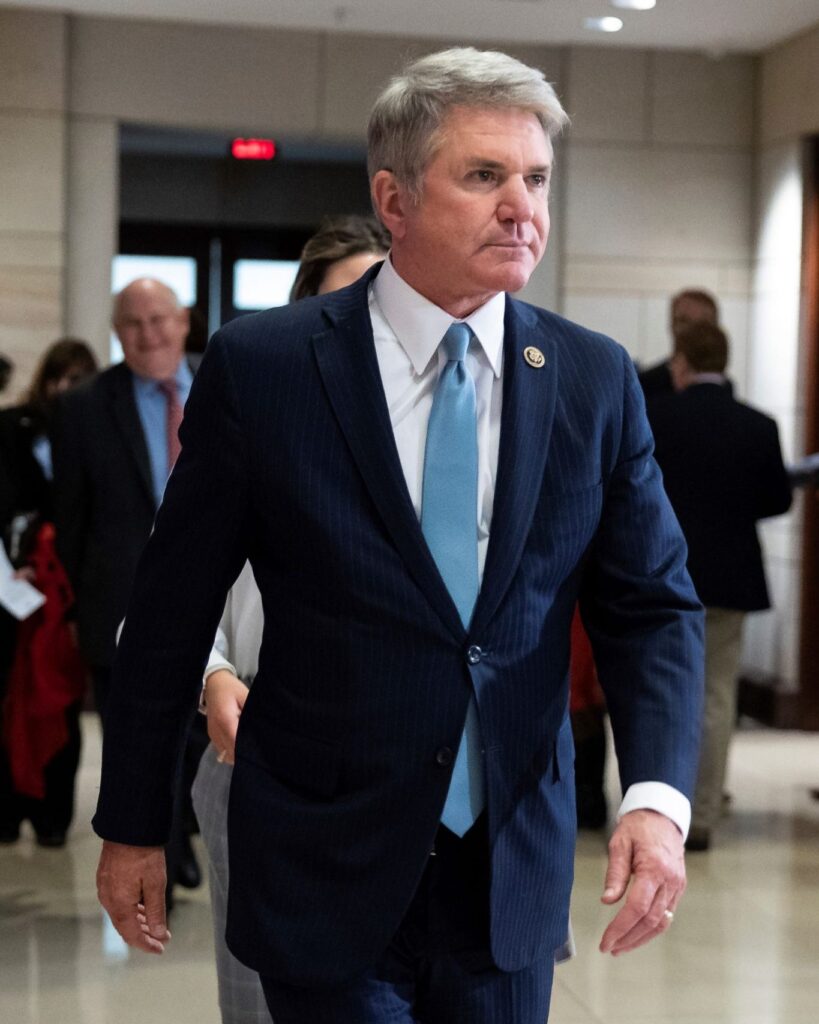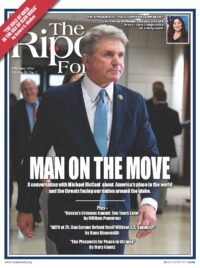 If it’s hard keeping up with Texas Congressman Michael McCaul these days, it’s probably because he’s rarely in one place for too long.
If it’s hard keeping up with Texas Congressman Michael McCaul these days, it’s probably because he’s rarely in one place for too long.
McCaul serves as Chairman of the House Foreign Affairs Committee. In this role, he is the point person on Capitol Hill for making sure members of the U.S. House of Representatives understand and are ready to confront the challenges facing America around the world. With no shortage of challenges facing us, McCaul has been on the move quite a bit lately, to say the least.
Last February, for example, he led a bipartisan delegation to Ukraine to meet with President Zelensky and get a sense of the war against Russia and how U.S. assistance was being spent. Two months later, in April, he led another delegation to Taiwan to meet with government and business leaders in that country and discuss ways the U.S. can strengthen our economic and defense relationship in the face of the growing Chinese threat.
In September, he traveled to Northern Europe to discuss Sweden’s accession into NATO and get a better sense of the threat posed by Putin and where our allies in the region stood. Two months later, in November, he was off to Israel, where the bipartisan delegation he led learned more about the threat posed by Hamas and Iran-backed proxies, and the need for steadfast support from the United States. Most recently, last month, he led a delegation to the southern border in our country to meet with U.S. and Mexican officials and get a better understanding of a migration crisis that seems to be getting worse with each passing day.
The Ripon Forum caught up with McCaul recently to learn more about what he saw in his travels and get his thoughts on America’s place in the world today. It is a world, he tells us, that is “on fire” and more dangerous than at any time since World War II. It is also a world that will no doubt be watching with great interest the elections in the United States later this year.
To that end, the Forum asked McCaul for his thoughts on the Republican message heading toward November. Looking beyond then, we also wanted to know what he sees as a future challenge facing America, and what our nation should be doing to prepare for that challenge today.
________________________________
RF: First things first – with this being an election year, what is the Republican case against the Biden Administration when it comes to foreign policy?
McCaul: Upon taking office, President Biden rescinded the policies, like Remain in Mexico, that kept our borders secure, and he and his administration refused to enforce our nation’s laws. The result: unprecedented illegal border crossings and the worst human trafficking crisis our lifetime.
Biden then shut down the Keystone Pipeline and waived sanctions on Nord Stream 2, destroying thousands of American jobs and begging other countries for oil. The country and entire world watched this president surrender to the Taliban in Afghanistan, laying the perfect groundwork for Putin to invade Ukraine.
We’re witnessing an increasingly aggressive Chinese Communist Party eye our key Indo-Pacific partner Taiwan, and Iran-backed Hamas terrorists launched an unprovoked war against our longtime ally Israel. Biden has repeatedly projected weakness, and weakness invites aggression.
His average job approval rating during his third year in office was the lowest of any president since Jimmy Carter. So simply put, President Biden is the architect of a failed foreign policy at every turn.
RF: And what about the case for Republicans? When Americans cast their ballots this fall, what should they know about the GOP and how the party will confront the threats facing our nation around the globe?
McCaul: Rather than leading from behind and destroying our credibility on the world stage, Republicans will continue to lead from a position of strength. We’ve seen the Biden administration fail to adequately address the threats and challenges facing the U.S., and deterrence is key here, not for war, but for peace.
The world is on fire right now, and it’s time to recommit to a strong foreign policy that stands by our principles, ensures the safety of our citizens, and protects our jobs.
The world is on fire right now, and it’s time to recommit to a strong foreign policy that stands by our principles, ensures the safety of our citizens, and protects our jobs.
RF: Let’s look at some of these threats. You are leading an effort on Capitol Hill to crack down on the flow of U.S. money into the Chinese military. Could you talk about this effort for moment, and some of the other steps America needs to take to meet the challenges we face from China in the years ahead?
McCaul: It is no secret that the Chinese Communist Party has dramatically ramped up aggression against the U.S. and our allies. In December of 2023, I released a report on the Commerce Department’s Bureau of Industry and Security (BIS) and determined that BIS has enabled a virtually unrestricted flow of American technology to CCP-controlled companies, enabling China’s rapid rise as a technological, economic, and military superpower. Russia has demonstrated that export controls and sanctions work before – not after – conflict.
We have a short window in which export controls and investment restrictions can deny, degrade, or at least delay CCP aggression. In order to maintain competitive edge against the malign influence of the CCP, the Commerce Department must institute necessary reforms to keep U.S. technology and taxpayer dollars out of adversarial hands.
RF: What about the Middle East? Our troops and ships are being attacked by terrorists, Israel and Hamas are engaged in open war, and the whole region appears to be on the verge of a broader and much more dangerous conflict. What should the United States do to defend our interests, support our allies, and keep the situation from spiraling further out of control?
McCaul: The administration needs to restore military deterrence immediately and put overwhelming economic pressure on Iran to restrict their ability to finance terrorist proxies attacking our forces. They claim that they haven’t lifted sanctions, but they aren’t enforcing sanctions either.
The first move they made was to lift terrorist designations on the Houthis and suspend critical support to our regional partners as they came under Houthi attack. Three years later, it’s clear the policy of Iran and proxy appeasement has failed. In the face of continued Houthi escalation in the Red Sea and Gulf of Aden, they’ve had to re-designate the Houthis as Specially Designated Global Terrorist, though fallen short of fully holding the Houthis to account with a Foreign Terrorist Organization designation.
Unfortunately, the administration has continually pursued these half measures over a misguided fear of escalation, but Iran and its proxies are escalating anyway. The Houthis are still attacking commercial ships and Iran’s proxies in Iraq and Syria killed three American servicemembers. Iran is not deterred, and we need decisive action against IRGC (Islamic Revolutionary Guard Corps) interests – not pin-prick attacks.
RF: You have been a staunch defender of Ukraine in its war against Russia. Last fall, your Committee published — along with the Committees on Intelligence and Armed Services — a “Proposed Plan for Victory in Ukraine.” Could you tell us more about this plan, and why it is in the best interests of the American people to do all we can to help the Ukrainian people defeat Putin and roll back Russia?
McCaul: I share my colleagues’ concern that we need to see a clear strategy for victory from the administration. We are two years into this war, and we have not seen such a strategy, and that is unacceptable. The American people deserve a clear vision on how their taxpayer dollars will enable Ukraine’s victory and Russia’s defeat in this war. We also need to continue to ensure that there is sufficient oversight over the assistance that we are providing Ukraine.

That being said, supporting Ukraine is squarely in the U.S. interest. The majority of Republicans still support Ukraine. The implications of a Putin victory would reach far beyond Ukraine’s borders. Following the disastrous withdrawal from Afghanistan, a U.S. decision to abandon Ukraine will make America less safe, convey weakness to our enemies, and make U.S. partners doubt our commitment.
Following the disastrous withdrawal from Afghanistan, a U.S. decision to abandon Ukraine will make America less safe, convey weakness to our enemies, and make U.S. partners doubt our commitment.
Moreover, supplemental funding is critical to reviving the U.S. defense industrial base so we are better prepared to deter our greatest adversaries like Russia, China, and Iran.
RF: Not all of our threats are overseas. You led a bipartisan CODEL this past month to assess the situation at America’s southern border, where a record number of migrants have been crossing over the past three years. What did you see there, and what steps do you believe need to be taken in the coming months to strengthen border security and bring this crisis to an end?
McCaul: In my 25 years of dealing with the border – as a federal prosecutor and the former chairman of Homeland Security – I’ve never seen the border this broken.
President Biden and Secretary Mayorkas have all the tools they need, like Remain in Mexico, a 30-year-old statute utilized by the Trump administration, to end the devastation at our border. We need fundamental policy changes before our border patrol – and America – loses hope.
RF: China … The Middle East … Ukraine … The southern border. America is facing more global challenges than perhaps at any time in our history. And yet as we saw when 19 terrorists hijacked four aircraft to attack us in 2001, and as we experienced when Covid shut down the world in 2020, the most serious threats we encounter are often ones we do not expect. What threats could we face in the future that we should be doing more to prepare for today?
McCaul: We are witnessing a struggle for the global balance of power in the world – that would be Russia, China, Iran, and North Korea. The Biden administration cannot bifurcate these world powers, and they’re all against freedom and democracy.
The world has not been this dangerous since World War II, and the administration can no longer underestimate our adversaries’ intentions to undercut U.S. interests at every turn. We need to treat them as the adversaries that they are.




